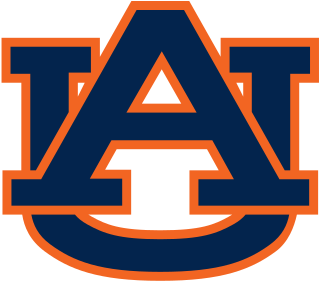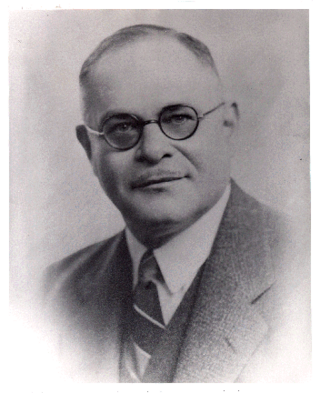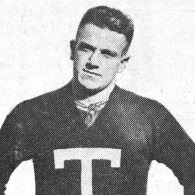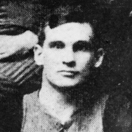Related Research Articles

John Franklin Broyles was an American college football player and coach, college athletics administrator, and broadcaster. He served as the head football coach for one season at the University of Missouri in 1957 and at the University of Arkansas from 1958 to 1976, compiling a career coaching record of 149–62–6. Broyles was also the athletic director at Arkansas from 1974 to 2007. His mark of 144–58–5 in 19 seasons at the helm of the Arkansas Razorbacks football gives him the most wins and the most coached games of any head coach in program history. With Arkansas, Broyles won seven Southwest Conference titles and his 1964 team was named a national champion by a number of selectors including the Football Writers Association of America.

John William Heisman was a player and coach of American football, baseball, and basketball, as well as a sportswriter and actor. He served as the head football coach at Oberlin College, Buchtel College, Auburn University, Clemson University, Georgia Tech, the University of Pennsylvania, Washington & Jefferson College, and Rice University, compiling a career college football record of 186–70–18.
Patrick Fain Dye was an American football player, coach, and college athletics administrator. He served as the head football coach at East Carolina University (1974–1979), the University of Wyoming (1980), and Auburn University (1981–1992) compiling a career college football record of 153–62–5. While the head coach at Auburn, he led the team to four Southeastern Conference (SEC) championships and was named the SEC Coach of the Year three times. He served as the athletic director at Auburn from 1981 to 1991 and was inducted into the College Football Hall of Fame as a coach in 2005. On November 19, 2005, the playing field at Auburn's Jordan-Hare Stadium was named "Pat Dye Field" in his honor.

The Georgia Bulldogs football program represents the University of Georgia in the sport of American football. The Bulldogs compete in the Football Bowl Subdivision (FBS) of the National Collegiate Athletic Association (NCAA) and the Eastern Division of the Southeastern Conference (SEC). They play their home games at historic Sanford Stadium on the university's Athens, Georgia, campus. Georgia claims four consensus national championships ; while the AP and Coaches Polls have each voted the Bulldogs the national champion three times. Georgia has also been named the National Champion by at least one polling authority in four other seasons.

William Anderson Alexander was an American football player and coach. He served as the head football coach at the Georgia Institute of Technology from 1920 to 1944, compiling a record of 134–95–15. Alexander has the second most victories of any Tech football coach. Alexander's 1928 Georgia Tech Yellow Jackets have been recognized as national champions by a number of selectors. Alexander was the first college football coach to place his teams in the four major post-season bowl games of the time: Sugar, Cotton, Orange and Rose. His teams won three of the four bowls. The 1929 Rose Bowl win, which earned his team the national championship, is the most celebrated because of the wrong-way run by California's Roy Riegels. Alexander was also the head basketball coach at Georgia Tech for four seasons from 1919 to 1924. He was inducted into the College Football Hall of Fame as a coach in 1951.

The Auburn Tigers football program represents Auburn University in the sport of American college football. Auburn competes in the Football Bowl Subdivision (FBS) of the National Collegiate Athletic Association (NCAA) and the Western Division of the Southeastern Conference (SEC).
Maxie Callaway Baughan Jr. was an American professional football player who was a linebacker in the National Football League (NFL) for the Philadelphia Eagles, Los Angeles Rams, and the Washington Redskins. Baughan played college football for the Georgia Tech Yellow Jackets.

The Georgia Tech Yellow Jackets football program represents the Georgia Institute of Technology in the NCAA Football Bowl Subdivision in the sport of American football. The Yellow Jackets college football team competes in the Football Bowl Subdivision (FBS) of the National Collegiate Athletic Association (NCAA) and the Coastal Division of the Atlantic Coast Conference (ACC). Georgia Tech has fielded a football team since 1892 and as of 2023, it has an all-time record of 756–540–43. The Yellow Jackets play in Bobby Dodd Stadium at Historic Grant Field in Atlanta, Georgia, holding a stadium max capacity of 55,000.

Eddie Lee Ivery is a former professional American football player.

David Irenus "Red" Barron was an American football and baseball player. Barron was a three-sport letterwinner at the Georgia Institute of Technology. In football, he was named second or third team All American twice, first-team All-Southern four times, and was an inductee to Tech's Hall of Fame and the Georgia Sports Hall of Fame. He was also twice an All-Southern baseball player at Tech. His brother was Carter Barron.

George Everett Strupper Jr., known variously as "Ev" or "Strup" or "Stroop" was an American football player. He played halfback for Georgia Tech from 1915 to 1917. Strupper overcame deafness resulting from a childhood illness and was selected as an All-American in 1917.

Albert Lorch Loeb was a standout college football player for the Georgia Tech Yellow Jackets football team, where he was nicknamed "The Yiddish Wildcat".

Albert Barnett "Buster" Hill was a college football player.
The 1932 College Football All-Southern Team consists of American football players selected to the College Football All-Southern Teams selected by various organizations for the 1932 Southern Conference football season. Tennessee won the Southern championship.
John Ryland "Twenty Percent" Davis was an American college football player. Davis was known as "Twenty percent" because he was considered twenty percent of the team's worth.

Harman Wayne "Pat" Patterson was an American college football player and engineer.
Byron Lambert "Consuello" "Crook" Smith was an American college football, baseball, and basketball player and coach inducted into the Georgia Sports Hall of Fame in 1979. He played for Mercer, and, after a short career as a baseball player and umpire in professional baseball, he was the head coach for the Georgia Southern Eagles team of Georgia Southern University. He was later assistant pastor and director of young people's work at Immanuel Baptist Church in Savannah.

Joel Harry Eaves was an American college football and basketball player, coach, and athletic director. He is perhaps most known for coaching basketball at his alma mater, the Auburn Tigers of Auburn University. He is the all-time winningest coach in Auburn basketball history. He was also once athletic director for the Georgia Bulldogs. Eaves was inducted into the Alabama Sports Hall of Fame in 1978.
The 1928 California Golden Bears football team was an American football team that represented the University of California, Berkeley in the Pacific Coast Conference (PCC) during the 1928 college football season. In their third year under head coach Nibs Price, the team compiled a 6–2–2 record, finished in second place in the PCC, lost to Georgia Tech in the 1929 Rose Bowl, and outscored its opponents by a combined total of 141 to 36. The team was ranked No. 2 in the nation in the Dickinson System ratings released in December 1928.

The Georgia Tech–Vanderbilt football rivalry is an American college football rivalry between the Georgia Tech Yellow Jackets and Vanderbilt Commodores. Both universities are founding members of the Southeastern Conference (SEC) and Southern Conference (SoCon), and Southern Intercollegiate Athletic Association (SIAA). Georgia Tech leads the series all time 20–15–3.
References
- ↑ Alen Gould (November 4, 1937). "Ends Stand Out In Round-Up Of Gridiron Stars". Sarasota Herald-Tribune.
- ↑ "2007 Georgia Tech Football" (PDF). p. 155. Archived from the original (PDF) on October 8, 2018.
- ↑ "Georgia Tech Athletics Hall of Fame". ramblinwreck.cmo. Archived from the original on August 7, 2016. Retrieved July 22, 2016.
- ↑ "Georgia Tech Alumni Magazine Vol. 28, No. 04 1950".